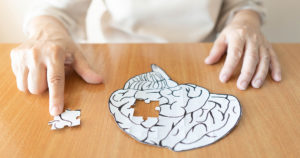
When should you worry about frequent forgetfulness?
We’ve all been there. You know what you want to say, but can’t remember the word. You forget the name of a favorite movie. You’re about to leave for an appointment, but you can’t find your car keys or phone.
Frequent forgetfulness or memory lapses often leave people worrying about dementia, diseases such as Alzheimer’s or other incurable, progressive conditions. But that’s not always the case.
Worried about your brain?
“Forgetting why you walked into a room on occasion, difficulty recalling the name of someone you just met or having a word on the tip of your tongue that later comes to you is typically not concerning,” said Lyndsay Mentgen, APRN, with OSF HealthCare Illinois Neurological Institute. “However, if memory loss starts to affect daily functioning – for example, missing appointments or forgetting to take medications – further evaluation is recommended.”
Common causes
Many common conditions and even some substances can cause forgetfulness. Lyndsay shared some:
- Depression, anxiety and stress – “These are common causes of forgetfulness,” Lyndsay said. “Stress and mood disturbances can act as a distraction and make it difficult to focus, which can lead to memory problems.”
- Medications – These can include but aren’t limited to over-the-counter sleep aids, allergy medications, overactive bladder medications and pain medications (specifically narcotics).
- Sleep issues – “Insomnia or untreated sleep apnea can affect thinking and memory skills,” she said. “Healthy sleep practices, treating underlying causes of sleep problems or being evaluated for sleep apnea might help these symptoms.”
- Vitamin deficiencies or thyroid abnormalities
- Excessive alcohol consumption
- Chronic pain
- Vision or hearing loss
“These problems can give a false impression of memory loss,” Lyndsay said.
When it’s more than just forgetfulness
When someone experiences forgetfulness, their initial fear may be dementia.
“A common misconception is that dementia is just a normal part of aging,” Lyndsay said. “But dementia is a loss in function that happens earlier or faster than what we see in normal aging.”
The most common cause of dementia over the age of 65? Alzheimer’s disease. Typical symptoms of Alzheimer’s disease include forgetting recent events or conversations, repetition or getting lost in familiar places. People who have Alzheimer’s disease usually don’t recognize that they are having these problems.
Another common cause of dementia is cerebrovascular disease, or damage to the blood vessels in the brain. This damage can be due to strokes and many of the same things that cause heart disease – for instance, poorly controlled high blood pressure, high cholesterol, diabetes and smoking.
While there is no way to reverse the damage that has been done, working to manage these conditions and healthy lifestyle changes can help to minimize the risk.
“No matter the cause of dementia, when there is memory loss, safety is a primary concern,” Lyndsay said. “Monitoring how a person is managing their medications and finances and observing driving skills can help identify problems that could become early safety issues.”
What to expect

If you are concerned about forgetfulness in yourself or a loved one, making an appointment with your primary care provider is the first step. When you meet with your provider, having examples of your memory loss can be very helpful. You will also be asked about sleep habits, mood changes and physical changes such as dizziness, tremor or falls.
And don’t delay. Sudden memory loss or confusion could also indicate a more serious problem such as a stroke or serious infection.
“Screening tests for memory and other cognitive skills are an important part of an evaluation, but these tests alone do not give a diagnosis,” Lyndsay said. “Findings of your physical exam, blood work and brain imaging are also considered. Further testing may be recommended.”
Whether it’s concern for yourself or for a loved one, having another person at the appointment can help you share needed facts.
“It can be extremely helpful to have a friend or family member with you to provide an outside perspective of changes they may have seen,” Lyndsay said.
Preventing memory loss and forgetfulness
Living a healthy lifestyle is important for brain health. Some ways that you may be able to slow memory loss and cut down on forgetfulness are:
- Healthy eating – Lyndsay said the MIND diet is beneficial for brain health. The MIND diet incorporates the DASH and Mediterranean food plans, which encourage eating brain-protecting foods such as fish, chicken, nuts and green leafy vegetables while avoiding processed foods and foods high in sugar and saturated fat.
- Exercise – Even low-impact exercise like walking 30 minutes a day five times a week can help.
- Staying active cognitively – Try mentally stimulating activities like reading, playing games, solving puzzles or learning a new hobby. The more challenging, the better.
- Socializing (safely, of course) – Social isolation can cause unhealthy stress and lead to depression. Forming and maintaining strong connections helps reduce stress and improve mood.
“I would encourage anyone concerned about forgetfulness or any other change in their ability to function normally to see their primary care provider,” Lyndsay said. “Taking the steps to identify and manage reversible or treatable causes may improve memory and provide better health in general.”